The LFF's Best Film Award winner, Ryusuke Hamaguchi’s Drive My Car follow-up Evil Does Not Exist, is a characteristic mix of extended takes and conversations, limpid beauty and dizzyingly intense dramatic incident, and just one of the festival's major auteur UK premieres.
It begins with middle-aged Takumi (Hitoshi Omika) chopping wood in a snowy clearing, and expands into life in his Japanese mountain village, which centres on its pristine river. An ill-considered glamping development threatens to poison the water, a proposal dismantled by the villagers at a consultation meant as a formality. Hamaguchi’s remorselessly articulate characters make silage provision grippingly dramatic, alongside our simmering awareness that Takumi’s 8-year-old daughter (Ryo Nishikawa, pictured) has wandered away, a fairy-tale figure straying off the woodland path. DP Yoshio Kitagawa’s piercingly sharp imagery is matched by Hamaguchi’s apparently discursive screenplay’s empathetic dialogue and disparate details, which snap tightly shut like the forest’s deer-traps. His nuanced meditation on development, fragile community, family and nature suspends the viewer in slow time, even as its utopia cracks and falls towards a mythic fate.
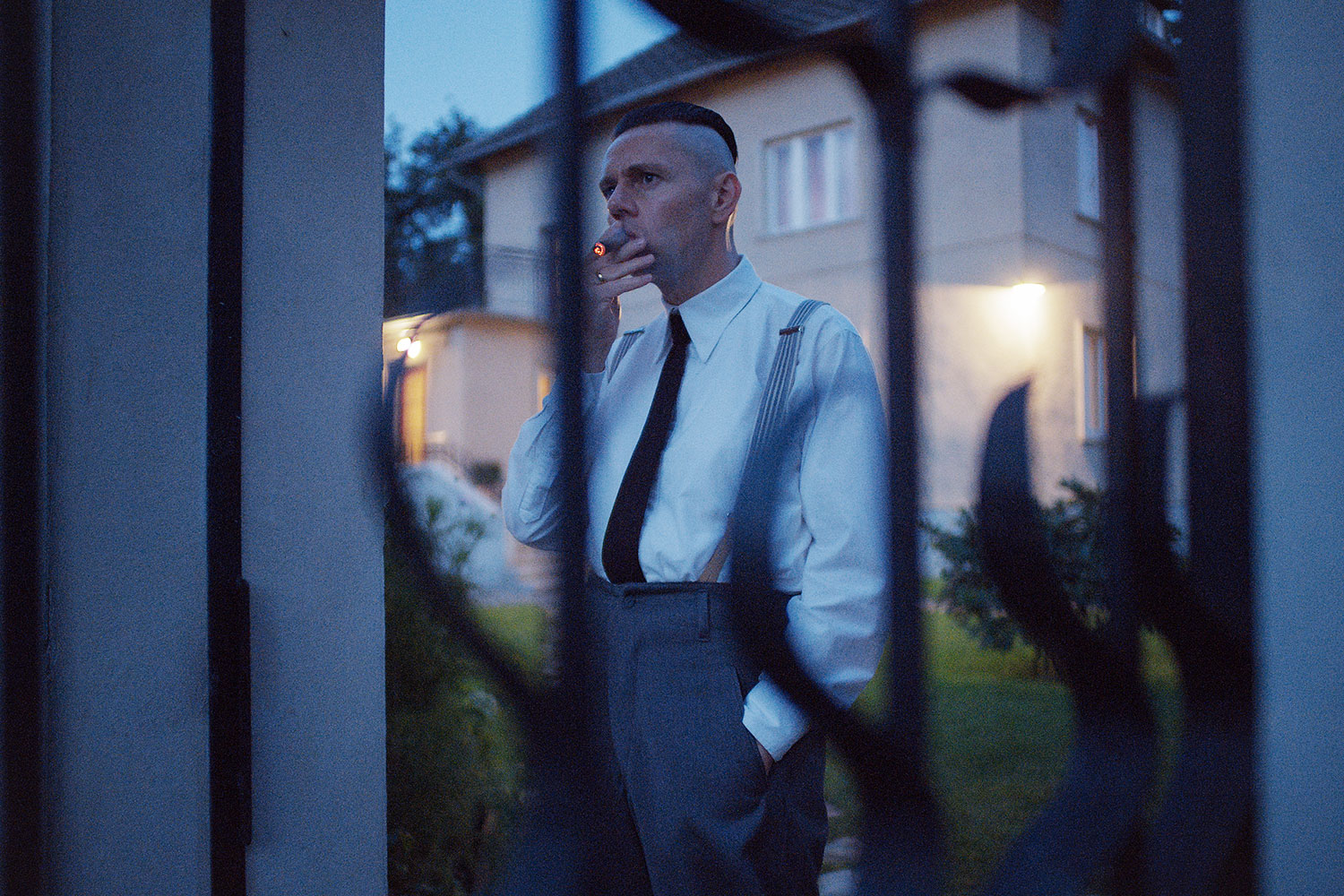 Jonathan Glazer’s singular career (Sexy Beast, Birth, Under the Skin) continues with The Zone of Interest, a typically free adaptation of Martin Amis’s Auschwitz novel. It’s mainly set in the manicured suburban home of camp commandant Rudolf Höss (Christian Friedel) and proud Hausfrau Hedwig (Sandra Hüller) - an Aryan heaven abutting its hell. Hedwig tends her perfect garden and packs her kids off to school, proud queen of her realm, while the charnel smoke, industrial roars, screams and her husband’s coarse tyrant barks over the wall are decorously ignored. “You really have landed on your feet,” Hedwig’s visiting Ma declares, but she can hardly stand a night in this delusory annex to industrial murder, pushing Germans’ compartmentalising of lives profiting from genocide (murdered children’s clothes are partitioned, a fur coat coveted) to a schizophrenic extreme. Hellish belches in the red night and white negative-image nightmares are intensified by Mica Levi’s ominous, rumbling sound design.
Jonathan Glazer’s singular career (Sexy Beast, Birth, Under the Skin) continues with The Zone of Interest, a typically free adaptation of Martin Amis’s Auschwitz novel. It’s mainly set in the manicured suburban home of camp commandant Rudolf Höss (Christian Friedel) and proud Hausfrau Hedwig (Sandra Hüller) - an Aryan heaven abutting its hell. Hedwig tends her perfect garden and packs her kids off to school, proud queen of her realm, while the charnel smoke, industrial roars, screams and her husband’s coarse tyrant barks over the wall are decorously ignored. “You really have landed on your feet,” Hedwig’s visiting Ma declares, but she can hardly stand a night in this delusory annex to industrial murder, pushing Germans’ compartmentalising of lives profiting from genocide (murdered children’s clothes are partitioned, a fur coat coveted) to a schizophrenic extreme. Hellish belches in the red night and white negative-image nightmares are intensified by Mica Levi’s ominous, rumbling sound design.
Anti-Semitism suppresses truth which nevertheless rises, in the black tide of humans reduced to effluent which envelops Rudolf’s family’s river-bathe, and the bile he spews. He sees himself as an overworked young bureaucrat on the rise, an unquestioning Reggie Perrin in a Holocaust-based middle-class, complete with a camp commandants’ Berlin awayday. Swastika ice sculptures and champagne adorn this gold-and-brown, gilt-and-shit-hued do, where Höss idly imagines how he’d “gas everyone in the room”. There’s a blackly ironic edge to Glazer’s script, very Amis, but laughs don’t come in this zone of the dead.
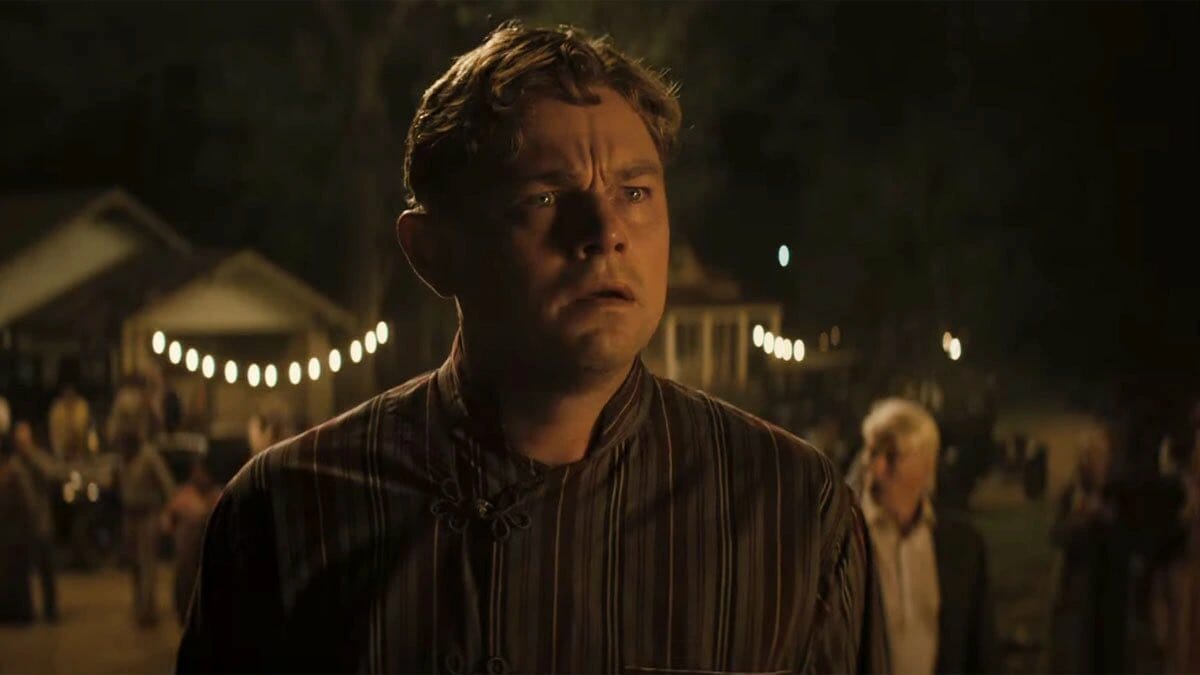 Martin Scorsese’s Killers of the Flower Moon is a bleak but propulsive 1920s Western which investigates America’s foundational capacity for genocide. Based on David Grann’s book on the oil bonanza discovered in the Oklahoma Reservation rump left to the Osage Nation, their elevation to chauffeured super-wealth and a murderous white conspiracy to steal it back, Scorsese revels in the frontier town, gold rush energy, and mourns the racist devastation.
Martin Scorsese’s Killers of the Flower Moon is a bleak but propulsive 1920s Western which investigates America’s foundational capacity for genocide. Based on David Grann’s book on the oil bonanza discovered in the Oklahoma Reservation rump left to the Osage Nation, their elevation to chauffeured super-wealth and a murderous white conspiracy to steal it back, Scorsese revels in the frontier town, gold rush energy, and mourns the racist devastation.
Ernest (Leonardo DiCaprio), newly discharged from ignoble World War One service as a chef, falls under the dark wing of his uncle, rancher William King Hale (Robert De Niro), who encourages his marriage to oil-rich Osage Mollie (Lily Gladstone), and contribution to Osage corpses dumped like garbage.
The palette is bleached, the tone grave, studded with flinty humour. The weight of murderous racism thickens the air, an American malaise, sickening the Osage as much as actual poisons. DiCaprio embodies this, his old boyish beauty now squashed into a weak, grasping, pug face, his declared love for Mollie undermined by a Judas kiss. He’s the detritus of a racist society, a pawn in their game. De Niro’s King recalls his quietly deadly Goodfellas mastermind, ordering a similar witness wipeout. That mobster chilled in his beckoning wave to Lorraine Bracco, promising death; here, Mollie’s denial of King’s will makes the light dim in his killer’s eyes. De Niro relishes the good ol’ boy veneer and malevolent charisma of this fork-tongued devil. Gladstone’s Mollie meanwhile deteriorates from coolly sharp-witted heroine to sickened, pacified victim, as Ernest’s spiritual fall leaves the Osage on the sidelines. It’s still an honourable, entrancing epic. Scorsese’s late friend and musical right hand man Robbie Robertson contributes a crucial score, combining blues guitar and tribal drums.
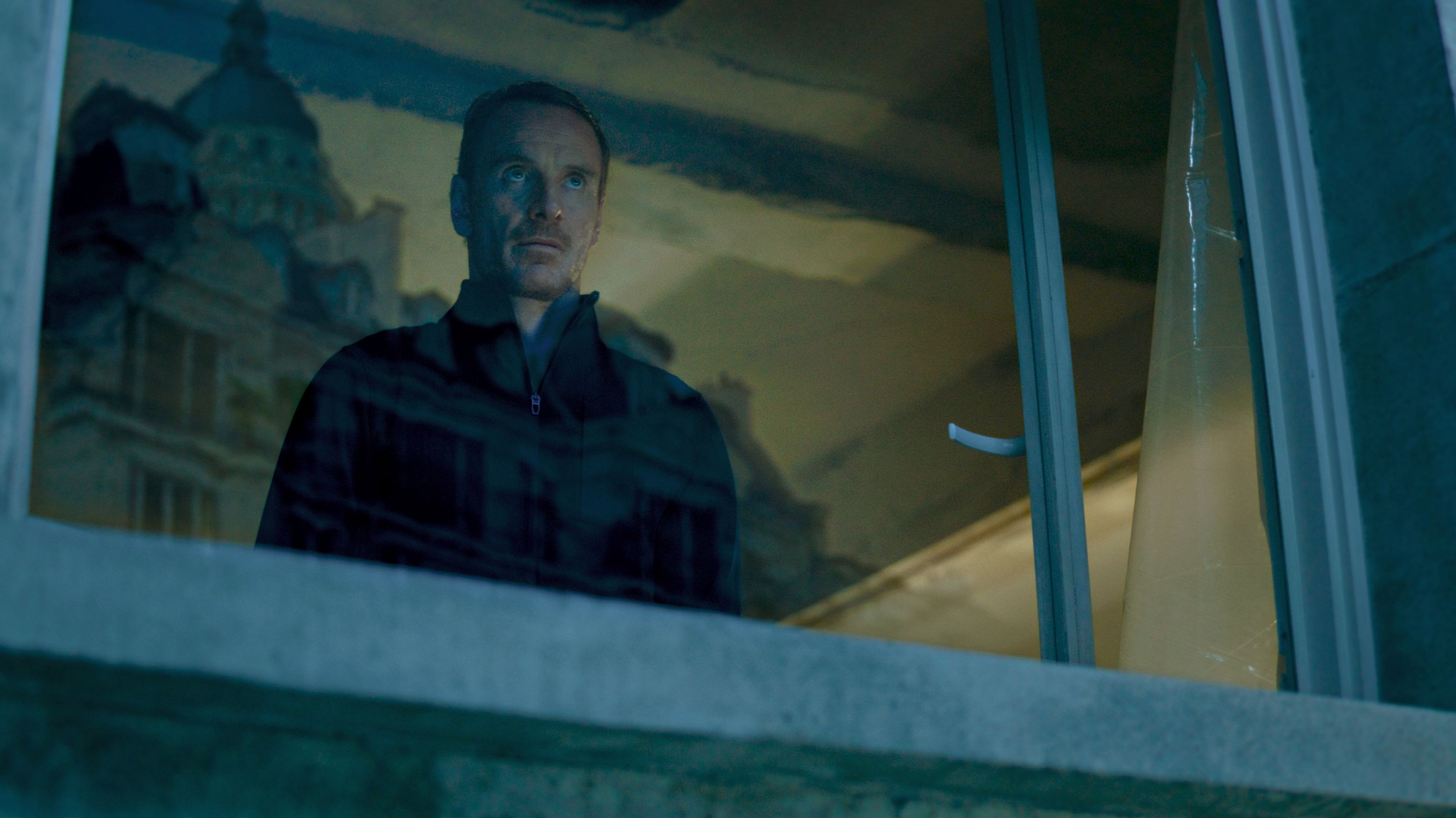 “Luck isn’t real. Or, sadly, justice,” Michael Fassbender’s nameless hitman intones in David Fincher’s The Killer, a reunion with Se7en screenwriter Andrew Kevin Walker essentially taking that film’s murderer’s viewpoint. “Make sure you’re one of the few,” not the helpless “herd”, Fassbender’s bullshit loquacious voiceover further advises, an amoral philosophy undermined in a botched hit’s vengeful aftermath. A filmmaking duo capable of putting Gwyneth Paltrow’s head in a hatbox enjoy the jolt as our blank antihero kills the innocent. The initial realism of his spartan, one-bar heater Paris hide is, though, undercut by a world of super-resourced, enigmatic and eccentric assassins straight out of John Wick, Killing Eve and The Killer’s own graphic novel source.
“Luck isn’t real. Or, sadly, justice,” Michael Fassbender’s nameless hitman intones in David Fincher’s The Killer, a reunion with Se7en screenwriter Andrew Kevin Walker essentially taking that film’s murderer’s viewpoint. “Make sure you’re one of the few,” not the helpless “herd”, Fassbender’s bullshit loquacious voiceover further advises, an amoral philosophy undermined in a botched hit’s vengeful aftermath. A filmmaking duo capable of putting Gwyneth Paltrow’s head in a hatbox enjoy the jolt as our blank antihero kills the innocent. The initial realism of his spartan, one-bar heater Paris hide is, though, undercut by a world of super-resourced, enigmatic and eccentric assassins straight out of John Wick, Killing Eve and The Killer’s own graphic novel source.
Fincher’s shark-like forward motion glides right through quick, smooth cuts as the Killer globe-trots like a bad Bond, from the Dominican Republic’s pastel-blue skies to an upstate New York meeting with Tilda Swinton’s sleek blonde rival. Fiona Bruce on the Antiques Roadshow comically prefaces a trademark crunching Fincher fight. Themes of masculinity and flickering humanity can’t, though, elevate his most glib, inconsequential film, which wastes the still luckless Fassbender, too.
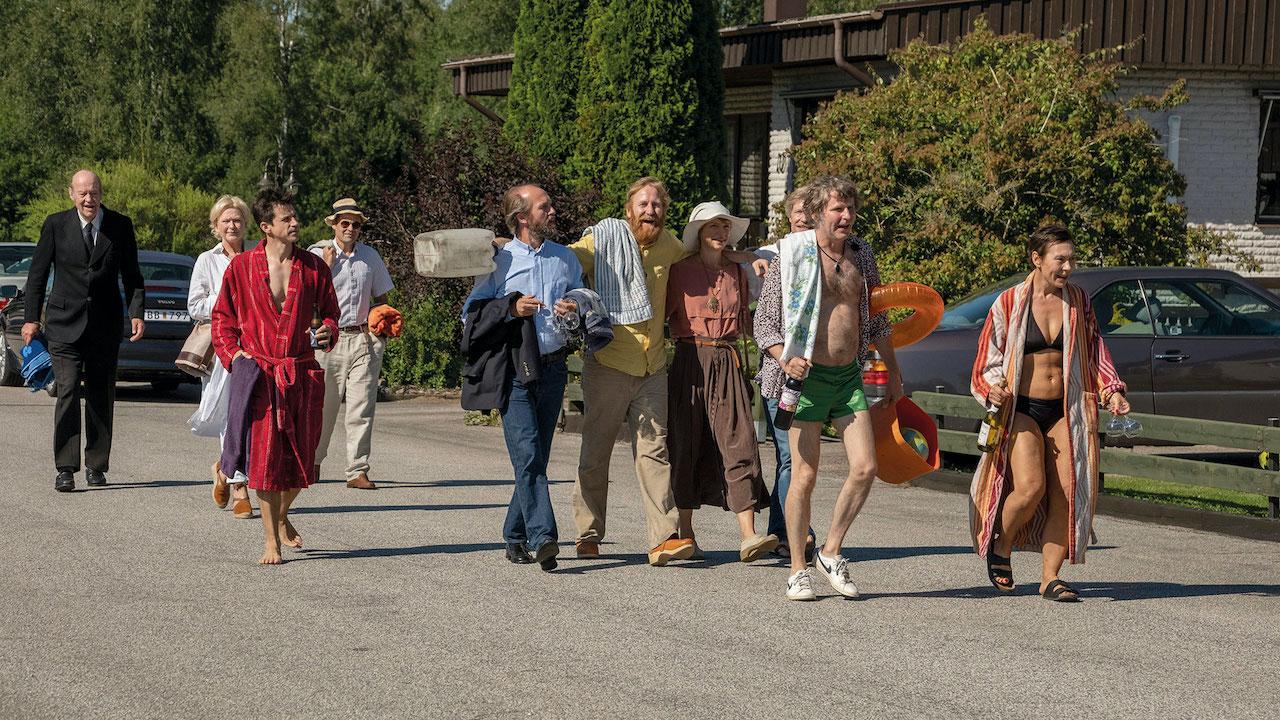 Lukas Moodyson’s Together 99 is his first film in a decade, and the sequel to Together (2000), his feelgood hit about a Seventies Swedish commune, reduced 24 years later to two remaining adherents absurdly arguing over washing-up. A surprise birthday reunion, plus a lonely ringer along for the ride, lets Moodyson show the erosion and endurance of love and ideals over time in a humane, impishly provocative coda to the original.
Lukas Moodyson’s Together 99 is his first film in a decade, and the sequel to Together (2000), his feelgood hit about a Seventies Swedish commune, reduced 24 years later to two remaining adherents absurdly arguing over washing-up. A surprise birthday reunion, plus a lonely ringer along for the ride, lets Moodyson show the erosion and endurance of love and ideals over time in a humane, impishly provocative coda to the original.
Spain’s Victor Erice has been still less prolific. The Spirit of the Beehive maestro’s Close Your Eyes is his first film in 21 years, and third fiction feature in 50. It concerns a Forties-set 1990 film left incomplete when its troubled star vanished. A 2012 investigative TV programme sets its director Miguel (Manolo Solo) in search of the actor, a fellow former Franco internee, bonding with his daughter and former lover en route. It’s an elegy to a declining world of mostly male anti-Fascist bohemians, sipping Scotches, writing sometimes, haunting bookstalls, hoarding celluloid. “The supreme issue, getting old” wrestles with “the things we do to survive”. At a disinterred cinema, light and shadow plays over rapt faces in the dark, in Erice’s love letter to all he knows.

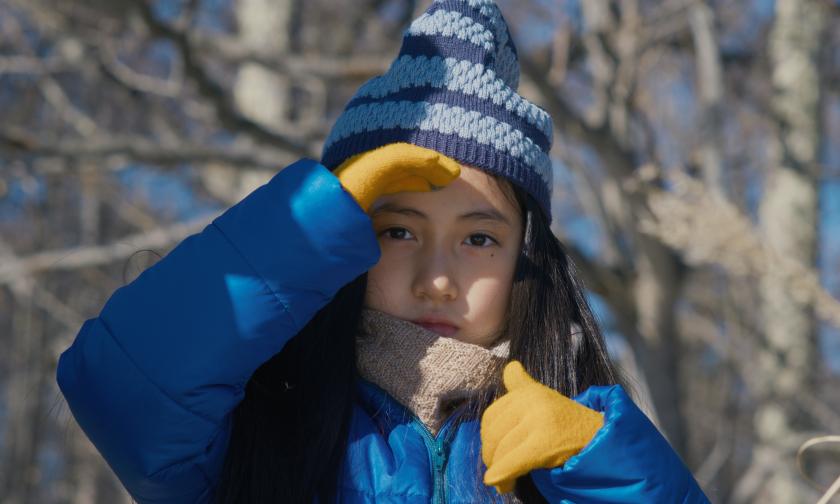













Add comment